Introduction
The survey
Nature of work
Access to work
Availability of work
Experiences of supply teachers when undertaking work in schools during the academic 2022/23 year
Experiences with schools, staff, parents and pupils when undertaking assignments
Provision of key information when undertaking assignments
Access to facilities and amenities in schools when undertaking assignments
Issues and concerns, including health and safety, for supply teachers during the academic year 2022/23
Rates of pay for supply teachers during the academic year 2022/23
Financial situation during the academic year 2022/23
Pensions
Training and behaviour management support
Conclusion
Introduction
Supply teachers are integral to the education system.
Without supply teachers, many pupils would be denied the opportunity to be taught by qualified and dedicated teachers who ensure that schools can continue to provide the education to which children and young people are entitled. Supply teachers make a vital contribution to securing high educational standards for all children and young people.
Despite this, the experiences of many supply teachers suggest that developments such as deregulation have had a detrimental impact upon the deployment of supply teachers and their pay and working conditions, particularly when considered against teachers with a permanent contract of employment.
The NASUWT’s annual survey of supply teachers in England aims to examine the changing experiences of supply teachers, including issues and trends.
The 2023 survey was undertaken between July and September.
A total of 697 supply teachers responded to the survey.
This Report provides the findings from the 2023 survey of supply teachers and highlights the experiences of supply teachers during the academic year 2022/23.
The survey
Nature of work
Supply teachers were asked why they carried out supply teaching work
The top five reasons cited by supply teachers were:
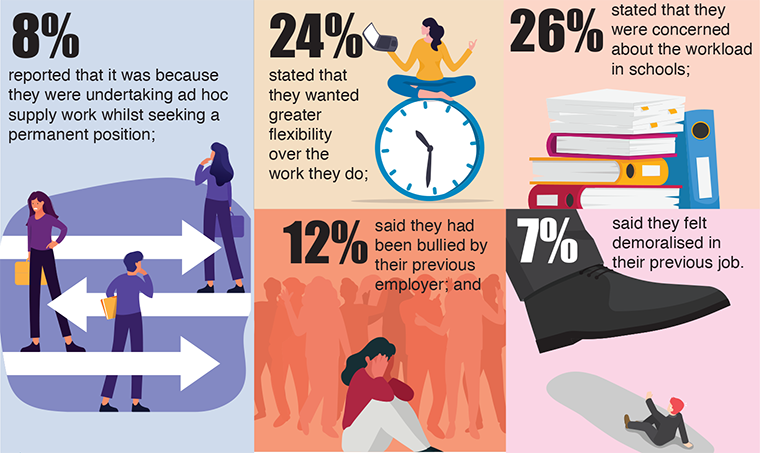
I needed to improve my wellbeing. The hours worked were unsustainable.
When asked what other advantages and disadvantages were associated with being a supply teacher, just over a third (34%) cited the lack of financial and job security, just under a quarter (24%) noted the work/life balance, 12% noted the ability to see how different schools work, just under one in ten (8%) noted the fact that there were no meetings to attend, one in 20 (5%) noted the fact that there was no planning and just under one in 20 (5%) noted the fact that they could go on cheaper holidays.
Supply teachers were asked about the ability to secure work teaching during the academic year 2022/23. Three-quarters (75%) reported that they had no problems securing work, whereas just over a fifth (21%) reported that they had some problems securing work. Just 3% of supply teachers reported that they had significant problems getting supply work and 1% stated that they could not secure any supply work.
Need to register with more agencies, but some agencies are better than others when it comes to getting work.
There are not enough teachers. If I could have cloned myself, I could have worked three times over.
Access to work
During the academic year 2022/23, just under a fifth of supply teachers (19%) reported that they were working for one school, one in ten (10%) reported that they were working for two schools and one in ten (10%) reported that they were working for three schools. 8% reported that they were working for four schools and well over one in ten (14%) reported that they were working for five schools. Two-fifths of supply teachers (40%) reported that they were working for more than five schools.
Of those supply teachers who reported that they were able to secure work during the academic year 2022/23, over four-fifths of supply teachers (82%) said that they had secured work through a supply agency, whilst 16% reported that they had secured work directly as a supply teacher by a school. A further 2% stated that they had secured work via a local authority supply pool.
For those supply teachers working through an agency during the academic year 2022/23, just under three-fifths (58%) stated that they were signed up to one agency to secure work, a quarter (25%) reported that they were signed up to two agencies, just over one in ten (11%) reported that they were signed up to three agencies and 3% reported that they had signed up to four agencies. Three per cent reported that they were signed up to five agencies.
For those supply teachers working through a local authority during the academic year 2022/23, three-quarters (75%) reported that they were signed up to one local authority, just under one-fifth (20%) reported that they were signed up to two local authorities and just 3% reported that they were signed up to three local authorities. Two per cent of supply teachers stated that they were signed up to five local authorities.
For those supply teachers working directly for a school during the academic year 2022/23, just under two thirds (65%) stated that they were employed by one school, 16% stated that they were employed by two schools, one in 20 (5%) stated that they were employed by three schools and 3% stated that they were employed by four schools. Just over one in ten (11%) stated that they were employed by five schools.
Very difficult to get schools to agree to pay directly.
The only way you seem to be able to secure work is through supply agencies.
Seventeen per cent of supply teachers stated that this was more than during the previous academic year, whereas 12% reported that this was less and 71% stated that it had stayed the same.
My regular agency couldn’t find me work in the first two weeks of the academic year, so I signed up with a second one. Luckily, things picked up.
I wanted to find more schools in my local area, so I’ve joined more agencies to increase my chances of this.
Have chosen to be on long-term supply at one school.
Just under a third of supply teachers (31%) reported travelling between 0-10 miles for an assignment, just over a third (35%) reported travelling between 11-20 miles, just under a quarter (23%) reported travelling between 21-30 miles, 6% reported travelling between 31-40 miles for an assignment and 2% of supply teachers reported travelling between 41-50 miles. One per cent of supply teachers reported travelling between 51-60 miles for an assignment, 1% reported travelling between 61-70 miles and a further 1% reported travelling between 71-80 miles during the academic year 2022/23.
Sixteen per cent of supply teachers reported that they had to travel further than in previous years in order to secure work.
Three-fifths of supply teachers (60%) stated that the cost-of-living crisis had a detrimental impact on how far they were willing to travel to undertake an assignment.
Availability of work
Supply teachers were asked where they were able to obtain work during the academic year 2022/23.
Forty-five per cent who responded to the survey stated that they were able to secure work in primary schools, 30% stated that they were able to secure work in secondary schools and just under one in ten (8%) reported that they were able to secure work in a special school/pupil referral unit (PRU). Seventeen per cent of supply teachers stated that their work was in ‘other’ settings (e.g. further education college).
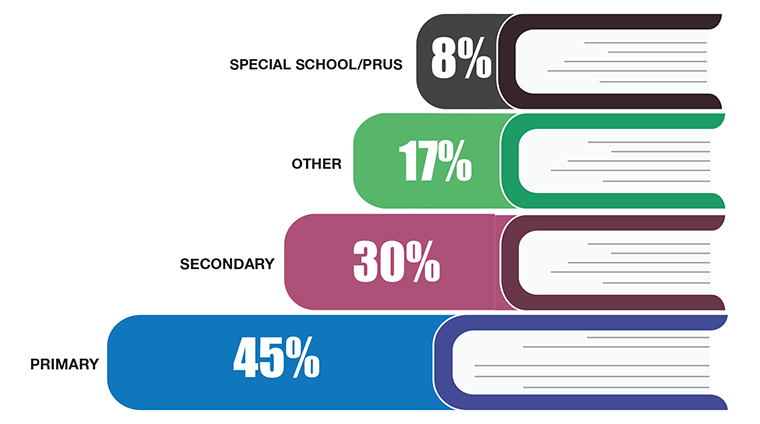
For those supply teachers who reported that they were able to secure work during the academic year 2022/23, well in excess of two-fifths (47%) reported that the majority of their supply teaching was ad hoc or daily work, 7% said that this was weekly assignments and just under one in 20 (4%) stated that this was monthly assignments. Just over one in ten supply teachers (12%) reported that the majority of their work was termly assignments and 30% stated that the majority of their teaching was on longer term assignments in excess of a term.
When supply teachers were asked how many days on average they were able to obtain work during the academic year 2022/23, 8% said they obtained work one day a week, just under one-fifth (18%) two days a week and just over a quarter (26%) three days a week. Sixteen per cent of supply teachers in the survey said they were able to obtain work four days a week and just under a third (32%) stated that they were able to obtain work five days a week. However, just under four-fifths (78%) said that they wanted to work between three to five days a week.
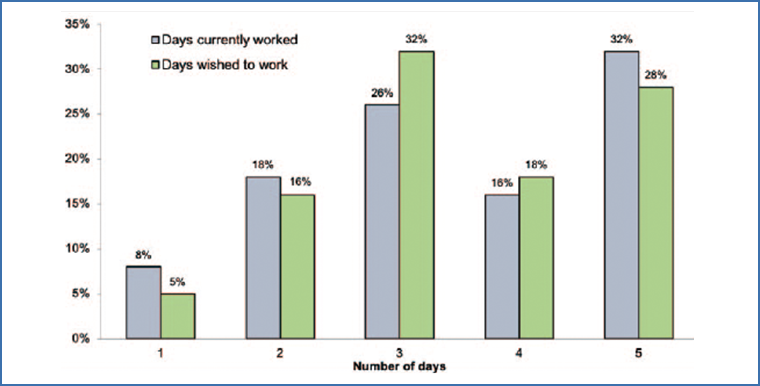
Fifteen per cent of supply teachers stated that the amount of supply work had decreased during the academic year 2022/23 compared to the previous academic year, whereas just over a quarter of supply teachers (27%) stated that the amount of supply work had increased. Just under three-fifths of respondents (58%) stated that the amount of supply work they were able to secure had stayed the same.
Experiences of supply teachers when undertaking work in schools during the 2022/23 academic year
Supply teachers were asked about their experiences when working during the academic year 2022/23.

Despite it being a legal requirement since April 2020, just over a third of supply teachers (35%) who obtained work through a new supply agency reported that they had been provided with a KID, detailing how they would be paid and associated deductions, as well as other key details and well in excess of two-fifths (46%) stated that they did not know whether or not they had been provided with a KID by the agency.
Very little positive communication throughout, especially regarding payment amount deductions and payment terms.
I have been with the agencies for more than a year. I’m not sure what the KID is.

I have been requested to sign a document before starting with a new agency to state that I will complete free trial days for temp to perm contracts.

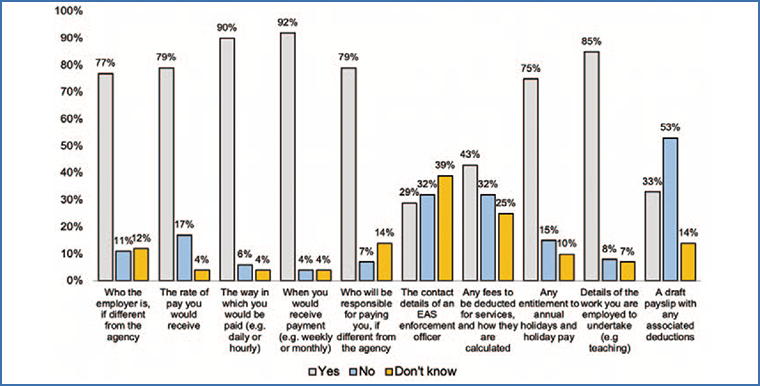
Just over two-fifths of supply teachers (41%) reported that an agency had suddenly and unexpectedly terminated a booking in the last 12 months. Of those, 23% stated that this had occurred once by one agency and 2% stated that this had occurred once by multiple agencies. However, 13% reported that this had occurred more than once by one agency and just under one in 20 (3%) reported that this had occurred more than once, through multiple agencies.
One agency seemed to book me in advance for a specific assignment (stating school/year group), but nearer the time they would regularly say that the school had cancelled and usually offer me an alternative assignment instead. It happened so often that I wondered if it was a ploy to book me so I didn’t accept work with anyone else.
Experiences with schools, staff, parents and pupils when undertaking assignments
Just over three-fifths of supply teachers (62%) reported that they are always made to feel welcome by the school and just over a third (34%) stated that they are often made to feel welcome by the school. However, 3% said that they are rarely made to feel welcome by the school and 1% reported that they are never made to feel welcome by the school.
When asked how welcome they are made to feel by the teaching staff in schools, just over a quarter of supply teachers (26%) reported that they are always made to feel welcome and well in excess of half (56%) reported that they are often made to feel welcome by the teaching staff in schools. However, 15% of supply teachers stated that they are rarely made to feel welcome by the teaching staff in schools and 3% reported that they are never made to feel welcome by the teaching staff in schools.
When asked how welcome they are made to feel by the support assistants in schools, 36% of supply teachers reported that they are always made to feel welcome and just under two-fifths (38%) reported that they are often made to feel welcome by the support assistants in schools. However, just over a fifth of supply teachers (21%) stated that they are rarely made to feel welcome by support assistants in schools and one in 20 (5%) stated that they are never made to be feel welcome by support assistants in schools.
When asked how welcome they are made to feel by the administrative staff in schools, just under half of supply teachers (48%) reported that they are always made to feel welcome and just over a third (34%) reported that they are often made to feel welcome by the administrative staff in schools. However, 13% reported that they are rarely made to feel welcome by the administrative staff in schools and just under one in 20 (5%) reported that they are never made to feel welcome by administrative staff in schools.
When asked how welcome they are made to feel by the pupils in schools, a fifth of supply teachers (20%) reported that they are always made to feel welcome and 28% reported that they are often made to feel welcome by pupils in schools. However, just under two-fifths of supply teachers (38%) reported that they are rarely made to feel welcome by the pupils and 14% stated that they are never made to feel welcome by the pupils.
In respect of being made to feel welcome by the parents, 4% of supply teachers stated that they are always made to feel welcome and one in ten (10%) stated that they are often made to feel welcome by the parents. However, just under two-fifths (39%) stated that they are rarely made to feel welcome by the parents and just under half (47%) stated that they are never made to feel welcome by the parents.
A quarter of supply teachers (25%) reported that they had experienced physical abuse or violence from pupils when undertaking an assignment and over three-fifths (62%) stated that they had experienced verbal abuse or violence from pupils when undertaking an assignment.

Just over nine out of ten supply teachers (92%) indicated that they had reported the incident/s to someone in the school; however, of those who did report the incident, 13% stated that no action was taken against the pupil and just under two-fifths (38%) stated that they didn’t know or were not informed whether or not any action was taken.
Myself and another excellent supply teacher were verbally abused in a high-risk situation. We reported it. She was reprimanded for doing so and we were not invited back to the school.
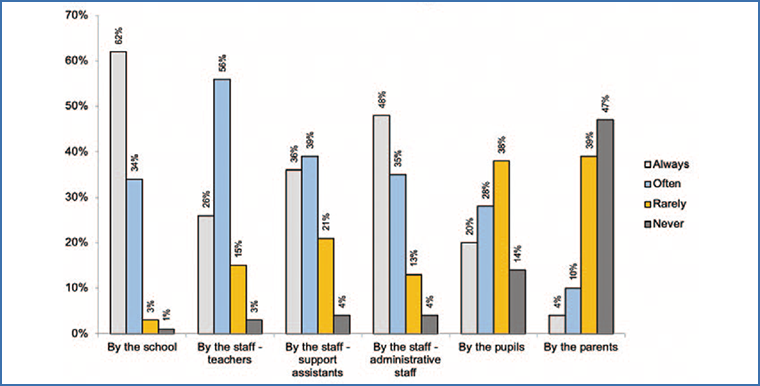
Provision of key information when undertaking assignments
Supply teachers who were able to secure work were asked about the provision of key information when undertaking supply teaching during the 2022/23 academic year.
Over half of supply teachers (53%) stated that they were not given the school’s overall risk assessment and over one in ten (12%) stated that they were not sure.
Just over a third of supply teachers (34%) stated that they were not given the arrangements in place for supply teachers to report safely to the workplace and just under three-fifths (57%) stated that they were not given the details of any procedures and protective measures in regards to Covid-19, including any financial support available.
Over half of supply teachers (53%) stated that they were not provided with the details regarding access to and availability of hand sanitiser and just under three-fifths of supply teachers reported that they were not provided with the details in place to ensure classrooms and work areas were well ventilated.
Eighteen per cent stated that they were not provided with the details of any designated contact(s) for any questions, problems or emergencies and one in ten (10%) reported that they were not given the details of who and where to report to each day, including details of the signing in process.
Just over a third of supply teachers (34%) reported that they were not provided with the details of how to raise any concerns about health and safety and just under a third (32%) reported that they were not provided with the details of how to call for assistance, including first aid. Furthermore, just over three-fifths of supply teachers (61%) reported that they were not provided with the details of the nearest first aid room or appropriate area.
In regards to the school’s fire evacuation plans, including routes and procedures, over a third of supply teachers (35%) reported that this was not provided to them when undertaking assignments in schools during the 2022/23 academic year.
Some details are given by some schools, but this is not always consistent.
A third of respondents (33%) stated that they had not been given a tour of the school site, including identifying where they would be teaching when undertaking assignments in schools.
In respect to the timetable, including breaks and lunch periods, as well as expectations on staff during such times, a fifth of supply teachers (20%) reported that information regarding this had not been provided to them when undertaking assignments in schools.
Just over a quarter of respondents (26%) reported that they had not been provided with the details of the registration process and expectations for the appropriate movement of pupils around the school site between lessons, at breaks, at lunchtimes and at the end of the school day when undertaking assignments during the 2022/23 academic year.
In regards to teaching, 31% of supply teachers reported that they were not provided with details of how to access relevant information on schemes of work for the subjects they were expected to teach and 28% reported that they had not been provided with access to relevant teaching materials.
I was shown most of these things when I was on a long-term placement, but much less likely to receive this on a daily basis.
In addition, 16% of supply teachers stated that they were not provided with the details regarding access to computers, with log-in details and what to do at the end of the school day and well over half (53%) reported that they were not provided with the details of any resources they might reasonably be expected to provide to students, such as pens.
Two-fifths of respondents (40%) stated that they were not provided with a list of the pupils in the class(es) they would be teaching, including details of any medical conditions, behavioural issues or special educational needs and disabilities (SEND) and just under three-fifths of supply teachers (57%) stated that they had not been provided with the details of any pupils known to be potentially violent and how this should be managed.
Furthermore, just over a third of supply teachers (34%) reported that they had not been provided with the behaviour management policy when undertaking assignments in schools, including who to contact.
Two-fifths of supply teachers (40%) reported that they had not been provided with the details of any events, meetings or specific activities taking place and well over half of supply teachers (53%) stated that they had not been provided with the arrangements for school transport, as appropriate, when undertaking assignments during the 2022/23 academic year.
Unfortunately, not all schools provide all information and can get cross with you if you ask too many questions. Some staff are quite rude; others do not even acknowledge you or deem it necessary to talk to you.
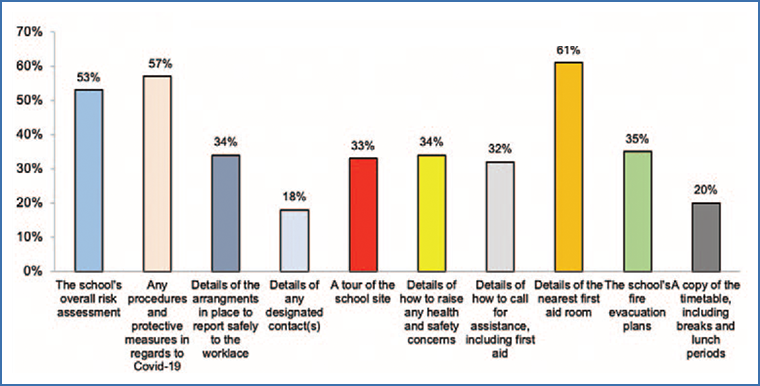
Access to facilities and amenities in schools when undertaking assignments
When asked about their most recent assignment, 29% of supply teachers stated that they do not always have access to staff rooms where they were available, just under three-fifths (58%) stated that they do not always have access to staff food and drink facilities and 16% said that they do not always have access to toilet/washroom facilities. Just under half of supply teachers (48%) reported that they do not always have access to car parking.
When asked about the assignments undertaken during the academic year 2022/23, well in excess of half of supply teachers (54%) reported that they had access to a designated contact person all of the time, whereas 28% reported having access to a designated contact person some of the time. Just under a fifth of supply teachers (18%) reported that they did not have access to a designated contact person.
Issues and concerns, including health and safety, for supply teachers during the academic year 2022/23
Well over a fifth of supply teachers (23%) stated that they do not feel that any issues and concerns they have raised are taken seriously and over a fifth (22%) stated that they didn’t know.
Just over a third of supply teachers (35%) who secured work during the academic year 2022/23 stated that they were concerned about their health and safety when in schools and one in ten (10%) stated that they may have been penalised or had work cancelled for disclosing personal information about their health and safety (e.g. pregnant, greater vulnerability to Covid-19).
I have had concerns over being blamed for incidents of children being violent purely because I am physically disabled.
I was told it may be best if I don’t reveal my disability.
Rates of pay for supply teachers during the academic year 2022/23
Supply teachers were asked about the rates of pay they were able to secure for assignments undertaken during the academic year 2022/23.
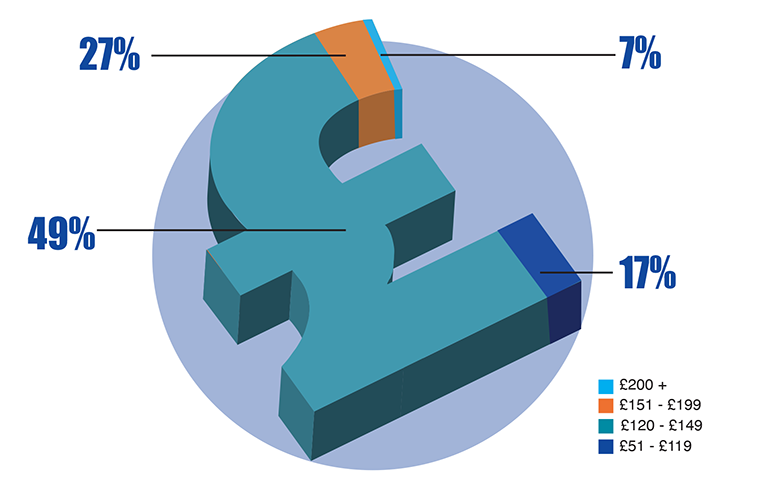
Seventeen per cent of supply teachers stated that they were paid between £51 and £119 per day for assignments, just under half (49%) stated that they were paid between £120 and £149 per day for assignments and just over a quarter (27%) stated that they were paid at between £151 and £199 a day for assignments. Seven per cent said that they were paid at over £200 per day for assignments.
Paid to scale with TPS as I worked directly with the school.
Despite the teacher pay scale rise, I haven’t been offered one by either agency.
My pay rate has never increased in over ten years.
During 2022/23, [my] rate increased due to scarcity of staff, plus my personal experience in schools where I had worked in previously.
Well in excess of half of supply teachers (55%) indicated that the rates of pay received during the academic year 2022/23 were the same as those they were able to earn in the previous academic year, whereas just 16% reported that the rates of pay received were less than those they were able to earn in the previous academic year. Twenty-nine per cent said that the rates of pay received had increased compared to those they were able to earn in the previous academic year.
I don’t know about the previous academic year, but when I worked as a supply teacher in 2007, I was making £170 per day because I was paid to scale. My pay in 15 years has gone down quite significantly.
I do not know quite why, but I earned more than double than the previous year.
When asked if the agency/agencies where they undertook work during the academic year 2022/23 operated a ceiling in respect of their remuneration, well in excess of half of supply teachers (54%) reported that the agency/agencies did.
£120/£125 flat rate for daily supply, regardless of experience.
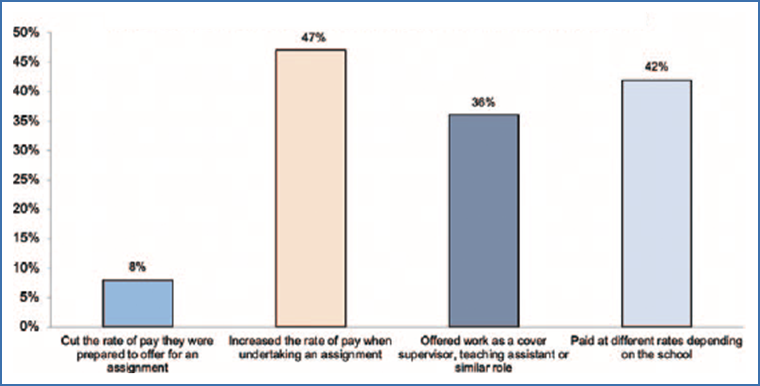
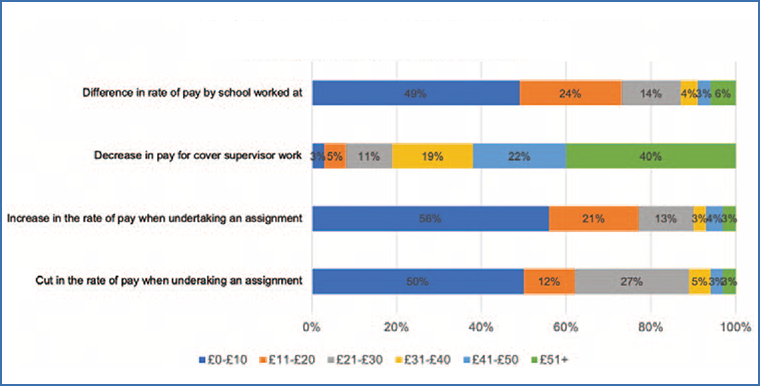
39% of supply teachers stated that they had been able to negotiate or secure an increase in their daily rate with an agency/agencies during the 2022/23 academic year.
Asking for extra money when travelling to further schools.
16% of supply teachers stated that they were able to secure more money when working through a local authority or directly with a school in comparison to supply work through an agency.
I get paid to scale (£180) – approximately a third more than the agency.
Just under one in ten supply teachers (8%) stated that they were able to secure work through the National Tutoring Programme (NTP) during the academic year 2022/23.
Of those who secured work through the NTP, just over a third of supply teachers (34%) reported receiving rates of pay which were more than they normally received as a supply teacher, whilst a fifth (40%) reported receiving rates which were less than they normally received as a supply teacher.
When I did look into it, they were asking the same of a permanent teacher but paying less.
I have done it in the past. I wouldn’t do it again because of the poor pay.
Financial situation during the academic year 2022/23
Supply teachers were asked about their financial situation during the academic year 2022/23.
Well over a quarter of supply teachers (28%) reported that they had sourced work elsewhere other than teaching during the academic year 2022/23. Of those, just over four-fifths (81%) stated that the work sourced elsewhere other than teaching failed to provide the same level of financial income that they would have obtained had they been able to secure work teaching.
Just over one in ten supply teachers (12%) reported having to claim some form of state benefit during the academic year 2022/23 (e.g. Universal Credit) and well in excess of two-fifths of respondents (46%) stated that they had experienced financial hardship as a supply teacher over the same period.
Forty-six per cent stated that they had experienced financial hardship as a supply teacher.
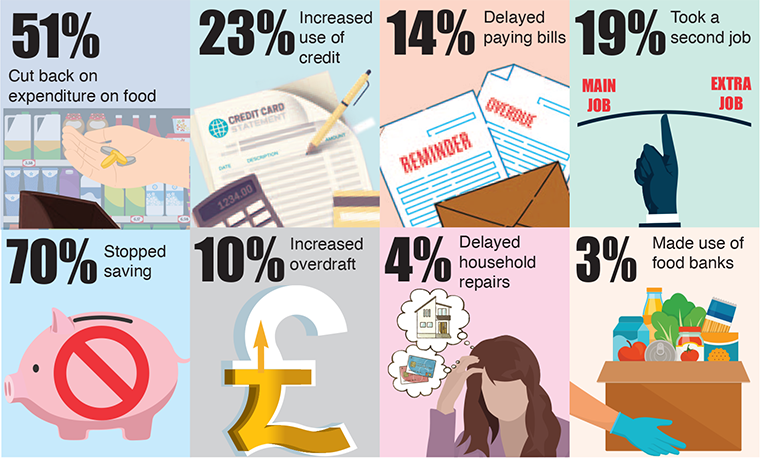
For the first time in my life I had to borrow off my parents, which at the age of 57 is pretty bloody embarrassing. I’ve never missed a mortgage payment ever, but I would have done had it not been for my mother lending me the money to do so.
Fifteen per cent of supply teachers reported that they were required to self-isolate during the academic year 2022/23. Of those, over half (53%) reported that their employer did not make them aware of whether they were eligible for Statutory Sick Pay (SSP) and over two-fifths of supply teachers (42%) reported that they did not know.
Pensions
Whilst the legislation prevents supply teachers working for a supply agency from paying into the Teachers’ Pension Scheme (TPS), just over three-quarters (76%) stated that they are still members of the TPS. Of these, well over a quarter (28%) reported that they were active members, two-fifths (40%) reported that they were deferred members and just under a third (32%) reported that they were drawing a pension.
Of those supply teachers who indicated that they were not members of the TPS, just over a quarter (26%) reported that they did not have any alternative pension scheme provision and just under one in ten (9%) reported that they were unsure.
The pension offered by agencies is nowhere near as good as TPS. Another way I am negatively impacted by being supply.
I think it is unjust that I am not able to be a member of the TPS when I teach as a supply teacher.
Training and behaviour management support
Well over two-fifths of supply teachers (45%) stated that they had not been given access to continuing professional development (CPD) opportunities in the last 12 months.
For those supply teachers who had access to CPD, the primary sources of training were obtained via a supply agency (59%), the schools at which they worked (36%), funded personally (18%) or from their trade union (13%).
Well over two-fifths of supply teachers (45%) stated that they had not been given access to CPD.
In regards to participating in in-service training (INSET) days provided by schools during the 2022/23 academic year, just 12% of supply teachers reported that they were asked to participate in all the INSET days in schools where they undertook assignments, whereas just under one in 20 (4%) reported that the majority of schools asked them to participate in INSET days and 13% stated that a few schools asked them to participate in INSET days.
Most schools don’t want to pay for supply on INSET.
Just over a third of supply teachers (34%) reported that they did not feel they were treated with respect and dignity.
I think there is less respect for your professionalism as a supply teacher.
Supply teachers are regarded as second-class citizens in the education world. We are denied the same rights with regards to pay, pensions and benefits as other qualified teachers. Denied access to the TPS, although we are the ‘bloodline’ to schools being able to function on a day-to-day basis. We are not the beneficiaries of any pay deals.
Based on their experiences as a supply teacher during the academic year 2022/23, just under two-fifths of supply teachers (36%) reported that they were looking for work outside of teaching.
I will have to think about leaving teaching as the work is scarce and I do not like the added stress of worrying if there is going to be enough work to pay the bills.
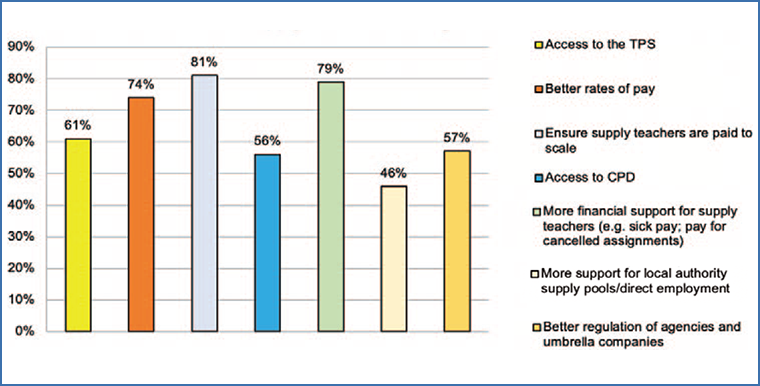
Exhausted, disillusioned. Passionate about teaching students, but there is a loss of trust in unprofessional agencies and the constant need to ‘barter’ my skills and knowledge at a much lower rate of pay.
I have witnessed a massive decline in financial benefits of supply teaching and am considering leaving the profession after 20 years due to the lack of security and poor pay and working conditions.
Conclusion
The 2022/23 survey of supply teachers emphasises the ever increasing importance of the role that supply teachers have played in schools and colleges during the 2022/23 academic year.
However, the survey suggests that the experiences of supply teachers throughout the 2022/23 academic year have been varied. For an increasing proportion of supply teachers, the opportunities for work has increased, including more regular daily assignments, as well as the opportunity for longer work in excess of a term, whereas others have been forced to travel further in order to secure work, despite the ongoing cost-of-living crisis.
Despite an increase in the level of payment received for daily assignments, for many supply teachers who are subject to the vagaries of intermittent and insecure employment, the cost-of-living crisis is ever more prescient.
Given the vagaries of intermittent and insecure employment, a number of supply teachers have had to make tough decisions about their expenditure, including cutting back on their expenditure on food and making use of food banks.
Of even greater concern is the fact that some supply teachers have been forced to rely on the generosity of family and friends to make ends meet.
Furthermore, the 2022/23 survey indicates that many agencies and schools are still routinely failing to provide key information to hard-working and dedicated supply teachers, including in regards to the pupils they are expected to teach, as well as critical health and safety information to enable them to discharge their duties safely as a supply teacher when undertaking an assignment.
There are concerns that these disparities in treatment are impacting disproportionately on women, Black and minority ethnic (BME) groups and disabled teachers, who are more likely to be employed as supply teachers.
In this context, the results from the 2022/23 survey substantiate the pressing need for a better deal for supply teachers which recognises and values the important and significant contribution they make to the education system in England.
The full survey report can be downloaded on the right/below.
